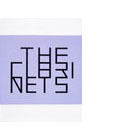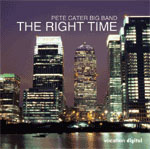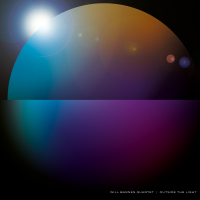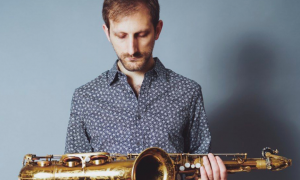Home » Jazz Articles » Interview » John Ellis: Emerging
John Ellis: Emerging
I feel much more at home if I'm writing the music or playing other people's original music. I'm less burdened by the shackles of tradition.
 Saxophonist John Ellis was known as one of the voices of the Charlie Hunter Trio, having toured with the eight-string guitarist in recent years. His searching sound can be heard on Hunter recordings like the recently released Copperopolis. Good years for Ellis, who was able to tour steadily and still work on building a solo career as one of the resourceful players on the scene.
Saxophonist John Ellis was known as one of the voices of the Charlie Hunter Trio, having toured with the eight-string guitarist in recent years. His searching sound can be heard on Hunter recordings like the recently released Copperopolis. Good years for Ellis, who was able to tour steadily and still work on building a solo career as one of the resourceful players on the scene.But now appears to be the time for Ellis, 32, a country boy from a farm in Cameron, N.C., population about 200, to make a stronger statement for himself.
"That's come to an end," he says matter-of-factly of his Hunter experience. "There was no drama, which almost seems to be a disappointment to some people who ask about it. To me, it's one of those things. No matter how good something is, it can come to a natural end, naturally runs its course and it feels right. The three of us felt like it was the right time. Charlie made the call, but I was right there with him. Derrick (Phillips), the drummer, was moving to Nashville" and the trio faded out naturally.
Now Ellis is out there with a new CD, By a Thread (Hyena Records), a strong statement of all-original music that uses elements taken from a variety of his experiences. It's his second album on the label, following One Foot in the Swamp (2005), and his fourth overall, counting a record he produced in 1996 in New Orleans (The Language of Love) that received no distribution support and "to my knowledge, only exists in my house," he quips in his easy-going fashion. (Second was Roots, Branches and Leaves on Fresh Sound.)
The band is solid, made up of musicians Ellis has known and played with: Aaron Goldberg , keyboards; Mike Moreno, guitar; Rueben Rogers, bass; Terreon Gully, drums.
 The nine tunes come from music that Ellis has had for a while, as well as things worked out more recently. "I had a weekly gig in New York at the tap bar at the Knitting Factory. A lot of music grew out of that. I had a few things kickin' around, but the rare opportunity of having a weekly gig in New York gave me the chance to work out the stuff," says Ellis. Writing is something Ellis has always enjoyed, including drawing up compositions played by the Hunter Trio. In fact, he says, original music isn't just something to do—it's important to him.
The nine tunes come from music that Ellis has had for a while, as well as things worked out more recently. "I had a weekly gig in New York at the tap bar at the Knitting Factory. A lot of music grew out of that. I had a few things kickin' around, but the rare opportunity of having a weekly gig in New York gave me the chance to work out the stuff," says Ellis. Writing is something Ellis has always enjoyed, including drawing up compositions played by the Hunter Trio. In fact, he says, original music isn't just something to do—it's important to him.
"I guess some people define themselves as interpreters of other people's material, particularly within the jazz idiom. Up to this point, I didn't think I had much of a home or much of a personal statement to make in that. I'd like to do it at some point, but up until now I feel much more at home if I'm writing the music or playing other people's original music. I'm less burdened by the shackles of tradition. My mind is less cluttered with thinking about how so-and-so might have played it. I get a lot of fulfillment from writing anyway. It's really fun."
"Tall Drink of Water" has Ellis playing tenor sax over a slick upbeat tempo that finds its way into urban funk, and back to upbeat for guitarist Moreno's engaging exploration of the theme. "Little Giggles" finds Ellis in a lyrical mood, over sharp grooves laid down by drummer Gully. "Old Man" takes a different direction entirely, the main theme winding serpentine, put forth briskly by Ellis' strong soprano playing before Goldberg jumps in for some funky, stutter-step piano licks that escalate into a toe-tapping fun romp. "Swirl" is serene, but features sweet guitar work by Moreno and Gully, as he does throughout, provides a strong rhythmic bed on which the others can jump. One of the main strength of the CD lies in the compositions. Some may bear the "curse" of being accessible, but they have underlying elements that keep the interest, and the groove, going. The group is tight as an ensemble and as individual soloists.
There are definitely elements of jazz, and other elements come and go, as one might expect from a musician who grew up with diverse musical influences. Ellis is unconcerned about outside perceptions. Just bring on the music, he seems to feel.
"Sometimes people want to own the term (jazz). There's an underlying battle that goes on for the definition of it. But it's interesting, because the more different kinds of music I play and the older I get, I feel the less invested I am in any of those things," he says. "You can be as equally invested in not playing jazz as you are in playing jazz. You can be anti-jazz. I don't want to be invested in any of those. I love jazz, really deeply. I don't have any bad feelings about it. But I don't necessarily feel allied with a certain sense of what you sometimes think of people playing jazz. I'm not waving the flag of anything, hopefully."
Ellis digs the group sound and has particular words for Moreno. "Mike and I went to school together" at the New School for Social Research, Ellis says. "I remember the first time I heard him when he was a freshman. I took a very circuitous route through school, in general, so I was older than him. I remember being totally blown away by him even when he was that young. He's about to make a record of his own, which is great. But up until now he's tragically undocumented, for my taste. He's been good for so long and hasn't recorded a lot, especially his own stuff."
"The last record that I did I thought about in a cinematic way, different people on different tracks. There were more people involved. I think this one is different in that it's all the same guys on every tune. You have a chance to see the different things that everybody can do."
Ellis hopes to tour in support of the new disc, and play more of his own music, "which I have been doing on and off for the last couple of years. With Charlie, it's the first opportunity I had to tour with someone like that. It was my first priority for reasons musical and practical. Now, it's fantastic time for me to begin to prioritize my own thing and be able to focus on that more."
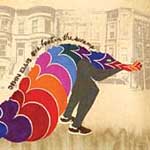 His "own thing" was germinated in the small North Carolina town where he listened to a lot of classical music on NPR radio that was on in his home. "My mom had a record collection that was really cool, but fairly limited. She had the Beatles and a bunch of great older country records, like Emmy Lou Harris, Willie Nelson. I was probably at least as influenced by my brother, who was really into hip-hop when it first started. I heard a lot of that," says Ellis.
His "own thing" was germinated in the small North Carolina town where he listened to a lot of classical music on NPR radio that was on in his home. "My mom had a record collection that was really cool, but fairly limited. She had the Beatles and a bunch of great older country records, like Emmy Lou Harris, Willie Nelson. I was probably at least as influenced by my brother, who was really into hip-hop when it first started. I heard a lot of that," says Ellis.
It was as a teenager that Ellis began to hear some jazz, including some improvisations on piano from an uncle who had taken some lessons briefly from Marylou Williams. "I got exposed to the process of improvisation when we would see him. He would play the piano and it seemed like magic: Wow. How does he do it? But I didn't have a chance to hear a lot of him."
Like many youngsters, Mom insisted on piano lessons for John and his brother. "Both of us hated it. I remember crying. I didn't particularly excel. In the sixth grade I played clarinet. In seventh, eighth, ninth and tenth grades I played the oboe. I ended up switching to the saxophone. The first time was to march in my high school band in ninth grade, because I couldn't march the oboe."
Oboe?
" I only chose it because I didn't know what it was. I thought that would be a great thing and distinguish me from everyone else with normal instruments. But I never fell in love with it. I used it as a ticket to get into the North Carolina School of the Arts, which is where I went when I was in tenth grade. I played oboe there for a year and then I convinced them to let me switch to saxophone. It seemed limited to me. My love for the oboe wasn't enough to carry me where I would need to go on that instrument. It was the best decision I ever made. Somehow, I convinced them to let me stay in this exclusive performing arts school and switch instruments, which is really unusual," he says.
At the School for the Arts, Ellis says the music curriculum there was like a university, "so I felt like, in some ways, I had gone to college already." It was also there that he made his first major connection. "Unquestionably one of my biggest influences was James Hollick, the teacher I had at the School of the Arts. He started me off from scratch—a lot of the things about playing the instrument, attitude toward music. He made a very strong impression on me when I was beginning to play. There are some things that will be with me forever that came from him."

From that school, Ellis went to University of New Orleans where he spent time in a program that wasn't very organized. Nonetheless, "there were amazing things you could get by hanging out with certain teachers that were there, but most things were very informal, not classroom oriented. In terms of the structure of music education, it was a step down. But the unstructured thing was really great. The end result is I ended up quitting school with the encouragement of the teachers I respected the most."
Ellis stayed in New Orleans, and the musical hotbed had a big impact. "I probably learned more there about playing jazz in those three years than I had. It was the beginning of my focus on playing jazz, and I mostly learned from playing it, listening and sitting in. It was a great window of opportunity. Nicholas Payton hadn't signed with Verve and was always around and always playing. He was enormously influential on all the young guys. It was really cheap to live and lots of informal gigs. I haven't seen anything that exists like that. It doesn't even exist like that there anymore. I haven't seen anything like it; a small community of people where everybody is hungry and there's a lot of chances to play. We had three or four weekly gigs where we just played jazz, just played tunes.
"When I was in New Orleans and we were playing jazz, very straight ahead music, I was obsessed with Dexter Gordon, Sonny Rollins, Charlie Parker. I even got heavily interested in Lester Young, Coleman Hawkins, Ben Webster. I got consumed by John Coltrane, as so many saxophone players do. I still think listening to Coltrane is dangerous for me. I think for lots of people it sounds so strong it pulls you in. It's like a tractor beam. All of a sudden your whole musical universe is defined by John Coltrane. You can hear that in people who came closer to him in age."
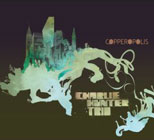 While in New Orleans Ellis was playing in the French Quarter when he had a strange encounter with a patron that led on one of several odysseys overseas. "This guy from Singapore during the gig flipped me a business card. I didn't even speak with him. It said, 'Call me up at the Sheraton. Here's my number if you're interested in coming to Singapore and playing with my band.' I was 18 or 19. I never even heard of Singapore, but I called him and spoke with him. He knew, and had played with people that I knew, so it didn't seem like such a random thing. A trumpet player named Leroy Jones had been out there. He had a record with, like, [drummer] Al Foster. I researched him a little bit and realized he was legitimate. I took the risk and went out there."
While in New Orleans Ellis was playing in the French Quarter when he had a strange encounter with a patron that led on one of several odysseys overseas. "This guy from Singapore during the gig flipped me a business card. I didn't even speak with him. It said, 'Call me up at the Sheraton. Here's my number if you're interested in coming to Singapore and playing with my band.' I was 18 or 19. I never even heard of Singapore, but I called him and spoke with him. He knew, and had played with people that I knew, so it didn't seem like such a random thing. A trumpet player named Leroy Jones had been out there. He had a record with, like, [drummer] Al Foster. I researched him a little bit and realized he was legitimate. I took the risk and went out there."
What was supposed to be six months to a year ended after three months when the club where he was playing in the house band failed. "But it was perfect for me, because I was about at the end of my time that I really wanted to be there," he adds.
Soon after returning to New Orleans, he traveled to Germany with Walter Payton, a bassist and father of Nicholas Payton. Ellis was got involved in the inaugural year of the Jazz Ambassadors program, run through the State Department. "We went o seven countries in African playing jazz duo, me and a guitarist. It was kind of crazy."
After returning to New Orleans, he was chosen as a semi-finalists in the 1996 Thelonious Monk International Saxophone Competition, with judges included Wayne Shorter, Jackie McLean, Jimmy Heath, Joe Lovano, and Joshua Redman. He tried New York City for a time, and returned to school. He finished studies at the New School for Social Research / Mannes Jazz between 1997 and 1999. All the while, he continued to freelance, record and work on his own music.
Then it was back to the Crescent City, where Ellis continued playing jazz in various groups including Jason Marsalis' quintet, among other work. When the school year ended, Ellis was gone, headed back to New York. All this work and experience was leading him down the road to recognition and career advancement, though Ellis, in his calm fashion, is hard pressed to think of it that way.
"When I was young, one of the first things that happened was when I went to the University of New Orleans I ended up meeting and studying some with Ellis Marsalis. The first tour I ever did was a little three-day tour when his record came out, Whistle Stop. That was a confidence boost. I started to fell like, 'wow, I might actually be able to do this.'" But, adds Ellis, "I'm not sure if I've ever had any big break. When I was in New Orleans I played with everyone and it never really had that kind of upward mobility feeling to me so much. I wasn't even thinking about that so much. I was trying to figure out chord changes and stuff. Unquestionably the biggest break, for lack of a better way of talking about it, I guess, was when I got the gig with Charlie Hunter. That was in 2000."
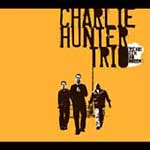 He said the Hunter gig that put his name out into a broader public realm, was "incredible good fortune and luck. I knew his playing. I had seen him play, but it would be unfair to say I was a fan, not being from the west coast, or whatever reason. New Orleans was a different scene. I just hadn't been swept up in the thing. I came to know his music a lot more after I started playing with him. He had done a tour with his band that was called Pound for Pound, with a band called Galactic, a New Orleans funk band, which my friend Stanton Moore had played in. Stanton told him during that time, 'There's this guy, John Ellis, you might want to check out.' This was maybe 1997 or something. I guess Charlie filed it away. Now that I know Charlie well I know how he never forgets anything, so it doesn't surprise me now."
He said the Hunter gig that put his name out into a broader public realm, was "incredible good fortune and luck. I knew his playing. I had seen him play, but it would be unfair to say I was a fan, not being from the west coast, or whatever reason. New Orleans was a different scene. I just hadn't been swept up in the thing. I came to know his music a lot more after I started playing with him. He had done a tour with his band that was called Pound for Pound, with a band called Galactic, a New Orleans funk band, which my friend Stanton Moore had played in. Stanton told him during that time, 'There's this guy, John Ellis, you might want to check out.' This was maybe 1997 or something. I guess Charlie filed it away. Now that I know Charlie well I know how he never forgets anything, so it doesn't surprise me now."
The two met later, randomly on the streets of Brooklyn. "He kind of knew who I was. He said, 'Stanton told me about you.' Amazingly, good fortune for me, he was thinking about adding a saxophonist to his band right at that time. It was kind of crazy. We talked on the phone a little bit. It was all very casual. I wasn't thinking I was auditioning, which was a testament to how slick he was. He came where I played and listened. So I did a couple gigs with him. It was kind of open ended. Then before I knew it, it was like, 'Wow, I guess I'm in the band.' He said, 'You want to make this record?' I said OK."
Ellis fit in with that group for the next four to five years. And now the focus is on his own music, which isn't necessarily what some people would define as jazz.
"Musically, I'm all over the map, increasingly. I think playing with Charlie had significance in term of opening me up to playing and feeling free to play in a band where the idiom is not really the objective. It was great for that. When you're playing with a guy that plays eight-string guitar, you're already in uncharted waters. I think it opened up some opportunities to try to hear music and play it—hear what's happening and play, accordingly. Without attention to any agenda that might be there," says Ellis. "Charlie had his agenda, for sure, but playing with him—he covers so much territory, you just kind of integrate with what's going on. That was incredibly influential, playing a lot of different kinds of rhythm-based music. A lot of the music I really love that wasn't jazz, I felt like I could bring it in and use it, whether it's Radiohead or Stevie Wonder, whatever it might be."
 In addition to the earlier jazz masters, Ellis finds influences and inspiration among his contemporaries as well. "I'm leaving out all kinds of people of course. I have checked out and been interested in everybody. Mark Turner, he spent some time in New Orleans. He made an impression when I was young. It was a period of his evolution that wasn't documented so well. He went through a couple phases where he incredibly imitated these other people, which is interesting because he doesn't sound like anyone at all know. His approach to music. His seriousness, his work ethic, made an impression on me when I was younger and I still think about it. Chris Potter is a magical improviser. Chris Cheek, Seamus Blake. There's a lot of guys I really enjoy."
In addition to the earlier jazz masters, Ellis finds influences and inspiration among his contemporaries as well. "I'm leaving out all kinds of people of course. I have checked out and been interested in everybody. Mark Turner, he spent some time in New Orleans. He made an impression when I was young. It was a period of his evolution that wasn't documented so well. He went through a couple phases where he incredibly imitated these other people, which is interesting because he doesn't sound like anyone at all know. His approach to music. His seriousness, his work ethic, made an impression on me when I was younger and I still think about it. Chris Potter is a magical improviser. Chris Cheek, Seamus Blake. There's a lot of guys I really enjoy."
As Ellis looks ahead, he says he has many ideas about recording that cross a broad musical spectrum. "I'm kind of grateful I have all these ideas. I don't know when I'm going to get to them. If I can really put it together, I'm going to try and do something in June. I have the next recording very close to being ready. I think if I can book the studio time, that will provide the incentive I need."
Says Ellis, "I just want to make music. I don't even feel qualified, sometimes to comment on what kind of music it is. Sometimes I don't even know. Maybe other people can tell me better."
Selected Discography
John Ellis, By a Thread (Hyena, 2006)
Charlie Hunter Trio, Copperopolis (Ropeadope, 2006)
John Ellis, One Foot in the Swamp (Hyena, 2005)
Charlie Hunter Trio, Friends Seen and Unseen (Ropeadope, 2004)
Charlie Hunter Quintet, Right Now Move (Ropeadope, 2003)
John Ellis, Roots, Branches and Leaves (Fresh Sound New Talent, 2002)
Charlie Hunter, Songs from the Analog Playground (Blue Note, 2001)
Jason Marsalis, Music in Motion (Basin Street, 2000)
Photo Credit: Michael Didonna
Tags
PREVIOUS / NEXT
Support All About Jazz
 All About Jazz has been a pillar of jazz since 1995, championing it as an art form and, more importantly, supporting the musicians who make it. Our enduring commitment has made "AAJ" one of the most culturally important websites of its kind, read by hundreds of thousands of fans, musicians and industry figures every month.
All About Jazz has been a pillar of jazz since 1995, championing it as an art form and, more importantly, supporting the musicians who make it. Our enduring commitment has made "AAJ" one of the most culturally important websites of its kind, read by hundreds of thousands of fans, musicians and industry figures every month.



